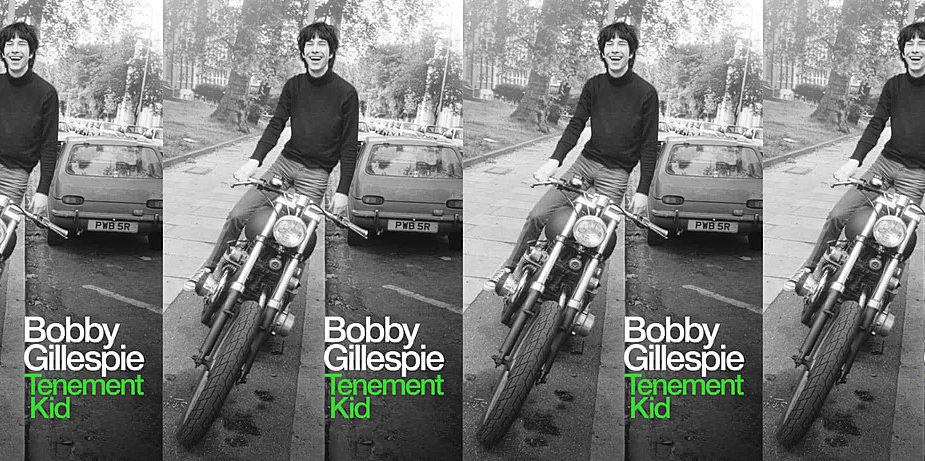
Bobby Gillespie – Tenement Kid (2021)
Tenement Kid: From the Streets of Glasgow in the 1960’s to Drummer in Jesus and Mary Chain and Frontman in Primal Scream
Despite being a great fan of Primal Scream, JAMC and Bobby Gillespie, nothing had prepared me for the greatness of his first memoir Tenement Kid. Written during the lockdown periods of the pandemic, it appears that Gillespie was only waiting to be freed from the restrictions of the short form in order to lay out his life experiences and convictions in a broader way than in song lyrics, articles, or interviews. And what a bliss that is.
Gillespie reveals himself as an elegant and eloquent writer with an authentic voice that is both sophisticated and street-wise, enthusiastic and serious; a voice that is introspective without exercising in public psycho-therapy. Having never lost his eclectic taste and enthusiasm in all art and particularly music, his exceptionally perceptive and knowledgeable descriptions of artists and their output could drive any music writer out of job. The evocative words that portray the art that shaped Gillespie’s life are of a vast beauty and make for an exciting personal tale of literacy in underground culture, an exquisite curation of music, film, literature and fashion. On 400 pages with no fillers, the receipts for an intriguing rock star biography are also all in here in depth- sex, drugs, rock’n’roll, and in this case also the mental Scottish football culture. Fans can probably hope for a second volume, since the memoirs cover Gillespie’s childhood and Jesus and Mary Chain years, and end with Primal Scream’s breakthrough with the glorious Screamadelica in 1991. And yet, Gillespie tells more than a rock star story in Tenement Kid.
When Gillespie is writing about his working class childhood in Glasgow, the class experience he shares is a universal one. Having grown up in Cologne in the immigrant working class, I repeatedly had to nod in agreement while thinking “That’s exactly how it was” when he was describing life in the working class, where fathers and their sons spend the better parts of their lives shift working in industrial factory halls and gathering in union meetings, and the family is cramped up in tiny apartments in said tenement buildings from the book’s title. It is a story of class struggle and class solidarity and the fight against the war of economic and intellectual marginalization while maintaining a dignified outside-of-society attitude. It is also the story of the power of art, literature and songs that echo in this gray tenement flat, of the films that flicker there and thus shape a boy, make him dream away, provide him an artistic route out.
Tenement Kid is immediately a classic of Glasgow literature and an essential read on Scotland and British politics & society up from Gillespie’s birth in 1961. And while there are many ways to refer to your date of birth, with most people resorting to daytime and weather descriptions à la “It was a dark and stormy night”, Gillespie’s is flanked by historical key data that gets delivered almost casually “I was born a year after the Cuban Missile Crisis, the year the Berlin Wall went up.” Actually, the only metereological report in the book reads like this: “It was as cold as Margaret Thatcher’s heart on the Charing Cross Road that evening…“. Bobby Gillespie cannot help it, the rebellion and fight against the class war waged on the working class is innate and natural as breathing for him, and his knowledge on intertwined political and economic issues shows. He is never falling into a lecturing tone, but gives information effortlessly and does his fans of the Brexit-Generation a great service by providing them countless starting points for further investigation on the ravaging rise of Neoliberalism and the free-market rule under Thatcher, and the development of British and Western society. Gillespie elaborates his feelings about Thatcher in many memorable, sincere rants: “I hated Thatcher like I would have hated Hitler had I been alive during the war years /…/ She was a malign and malevolent presence, not just in British life, but in the world. She inspired many similarly warped and deceitful disciples; sleazy, smarmy, Oxbridge-educated spiv politrickters such as Tony Blair, Boris Johnson, Nigel Farage and George Osborne- all are Thatcher’s children and I hate them all equally. But I hate her more. She was their Elvis.” It’s beautiful. Gillespie is no boutique activist, but a pure, socialist heart committed to the greater case. In times where the world goes to hell and even left institutions in power are devoid of a social agenda, in times where art escapes the reality of social tyranny and system-made climate change and stands in silence, undeterred voices like Gillespie’s are more important than ever.
Thinking of it, there was indeed an event in recent times which should have prepared me for the greatness of Tenement Kid: Bobby Gillespie being on a BBC broadcast in 2018 and refusing to join the host and guests of the show (one of them a Labour MP) performing a bizarre dance at the end of the show. Bobby spoke for all of us who are paralyzed and detached from the humiliating clown show that is contemporary society by sitting there stone-faced and expressionlessly disgusted. The skinny, deadly Glaswegian rock’n’roll legend challenged the reputation of every Sergio Leone cowboy when he dissociated in real time from the deranged political burlesque and perpetual meaningless high-noons of our media reality. It is not personal tragedies or rock’n’roll pathos that turn you emotional while reading Tenement Kid, but the absolute integrity and commitment that pervades Gillespie’s every sentence.
by Saliha Enzenauer
(Tenement Kid will be published on 28 October 2021 via Third Man Books)
